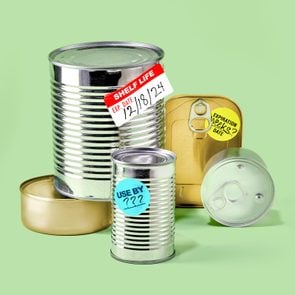How Long Does Rice Last in the Fridge?
Updated: Aug. 29, 2023

No one wants to eat leftover rice that has gone bad or might make them sick. Knowing how long rice lasts in the fridge can help you avoid illness and maximize the life of your leftovers.
We never want to waste food, especially food that’s cooked and ready to eat. Rice is one of the easiest and tastiest side dishes or bases for hearty meals, so we often have it on hand. But how long does rice last in the fridge? Like the answers to the more general questions of how to store food in the fridge and how long leftovers last, the answer is that it varies.
“It all depends on how well it was cooked, how long it stayed out at room temperature and how fast it cooled,” says Keith R. Schneider, PhD, a food safety professor and researcher at the University of Florida. Don’t worry—it’s not nearly as confusing as you may think.
Here, we’re getting to the bottom of the fridge organization tips that will best preserve your rice (remember, rice is actually a nonperishable food), the steps you need to take to avoid fried rice syndrome and more. Read on to find out.
Get Reader’s Digest’s Read Up newsletter for more food tips, humor, cleaning, travel, tech and fun facts all week long.
How long does uncooked rice last?
Dry, unopened, uncooked rice will last for quite a while in your pantry. Dry white rice (which includes varieties like arborio, basmati and jasmine rice) will last almost indefinitely in an airtight food-storage container, with studies having found that it maintains its flavor and nutrients for up to 30 years. After you open white rice, provided that you continue to store it in a sealed container and in a cool place, it will keep for one to two years.
Brown rice, on the other hand, lasts for only six months or so, thanks to its higher oil content.
How long does cooked rice last in the fridge?
Under optimal conditions, cooked rice will last four to six days in the fridge, says Schneider. But the length of time leftover rice will last in your fridge has to do with a variety of factors: its cooking method, how long it stayed out at room temp, how quickly it cooled, which food-storage container you choose, how crowded your fridge is (refrigerator organizers can help with that) and how much rice you have.
“Did you make an entire rice cooker’s worth of rice and toss it into the fridge in a large container with limited airflow, or use a shallow container with lots of airflow? It has an impact,” Schneider says.
Keep in mind that the answer to “How long does rice last in the fridge?” applies to healthy people who are not at an increased risk for food-borne illnesses. “If you’re in an at-risk group [such as older or pregnant people], I’d be more conservative and say two to four days,” he says.
How do you know if rice has gone bad?
When you’re trying to determine how long rice lasts in the fridge and if it has gone bad, many of the same rules apply as when you’re seeing how long milk lasts or how long chicken lasts. If it’s slimy, smells bad or has visible discoloration, it’s best to toss it. Likewise, if you take it out of the fridge and it is hard, dry and crunchy, the rice is past its prime.
What happens if you eat leftover rice that has gone bad?
If you eat leftover rice that is noticeably bad, you may just suffer through a nasty bite of food—or you might get seriously ill.
Gross food
If you try to eat rice that has been stored in the fridge for too long, it might simply mean that the rice no longer tastes right—and this can affect the flavors of the other foods on your plate too. Likewise, the texture of rice is going to deteriorate the longer it is stored in the fridge, going from light and moist to dry and crunchy. And nobody likes crunchy rice.
Fried rice syndrome
This is the most common cause of food poisoning from eating leftover rice. The result of a contamination of the bacteria Bacillus cereus, fried rice syndrome becomes an issue only when the rice doesn’t go straight from the pot to your plate.
“The vast majority of rice is eaten immediately after cooking,” says Schneider. “You need a lot of hours for it to become problematic.” But if rice is left out at room temperature for too long or a large portion of warm rice is stored in the fridge in a deep container, these bacteria can proliferate and cause problems.
The most common types of illness from fried rice syndrome are vomiting and diarrhea, but in very rare cases, if rice contains an abnormally high amount of B. cereus, it can cause a more serious sickness.
While making sure to throw out leftover rice after six days, or a week max, is a smart way to stay safe, the bigger key to avoiding these issues is to make sure you are storing the rice properly.
How to store cooked rice in the fridge
How long does rice last in the fridge? Longer if you get it in there fast and in the right container. To maximize the shelf life of your cooked rice, follow these tips from our experts.
Get it in the fridge fast
Schneider recommends heeding the two-hour rule when it comes to rice: Leftovers should not be left on the counter at room temperature for longer than two hours. If they are, you risk the food entering the temperature danger zone, where bacteria can grow.
Use a shallow, airtight container
“A large pot of rice will stay warm in the refrigerator,” Schneider explains. “It may take five to seven hours to cool down if you don’t pack it in a shallow container.”
That’s a problem because the rice will stay in the danger zone for bacteria growth. If you’re filling an entire container with rice, use one that’s no deeper than 4 inches. Glass storage containers, especially those with clasps on the lids, are airtight and microwave safe, making them a smart choice. Better yet, use a resealable bag.
“To save room in the fridge, I love storing rice in a reusable silicone bag such as the Stasher brand,” shares meal prep expert Taylor Stinson, founder of the healthy-eating blog The Girl on Bloor. “Just make sure to squeeze out all the air.”
Consider the freezer
If you’re not sure whether you’ll eat your cooked rice within five or six days, consider popping it in the freezer instead of the fridge. “You can keep frozen cooked rice on hand for three months and easily reheat it for a minute or two in the microwave for last-minute dinners,” Stinson says.
Can you freeze it after it’s been refrigerated? You bet! If your leftover rice reaches day four or five in the fridge, that’s a great time to transfer it to the freezer.
Does the type of rice affect how long you can store it?
“To my knowledge, all rice lasts the same amount of time in the fridge and freezer,” says Stinson. “I haven’t noticed a difference in quality or texture based on rice variety.”
The only exception is if you make a rice dish like risotto or a casserole with something mixed into the rice. These dishes have a shorter shelf life.
How long does rice last in the fridge when it’s incorporated into a dish? “If you end up using arborio rice to make risotto and cheese is mixed in, it should be eaten within three days to avoid the cheese getting a slimy texture,” Stinson suggests.
What’s the best way to reheat leftover rice?
As with any time you reheat leftovers, an extra step or two can transform your rice from cold and dry to moist and fluffy. “I prefer to sprinkle a little bit of water over the top before reheating rice in the microwave to prevent it from drying out,” Stinson says. “Just 1 to 2 teaspoons are all that’s needed to revive rice to its former glory.”
If you have a bit more time or want to add flavor, you can use the stove. “You can also reheat in a skillet on the stove with a bit of cooking oil or butter,” Stinson shares. “And again, I’d recommend adding some water just so it doesn’t dry out.”
Keep in mind that neither of these methods is likely to kill any bacteria that has developed in the rice. It’s also smart to avoid reheating rice too many times, as this merely provides more opportunities for illness-causing bacteria to flourish.
Now that you’re an expert on how long rice lasts in the fridge, brush up on meat-storage guidelines and learn the foods you should never eat past the expiration date.
About the experts
- Keith R. Schneider, PhD, is a food safety professor and researcher at the University of Florida. The primary focus of his research is food safety and, in particular, produce safety and food defense.
- Taylor Stinson is the founder of The Girl on Bloor, a food blog where she shares healthy meal-prep recipes for busy people.
Source:
- Utah State University: “Storing White Rice”



